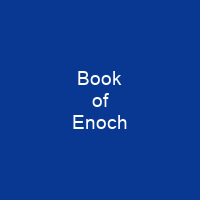Book of Enoch

The Book of Enoch is an ancient Hebrew apocalyptic religious text, ascribed by tradition to Enoch, the great-grandfather of Noah. Enoch contains unique material on the origins of demons and giants, why some angels fell from heaven, and an explanation of why the Genesis flood was morally necessary. It is today wholly extant only in the Ge’ez language, with earlier Aramaic fragments from the Dead Sea Scrolls and a few Greek and Latin fragments. No Hebrew version is known to have survived.
About Book of Enoch in brief
 The Book of Enoch is an ancient Hebrew apocalyptic religious text, ascribed by tradition to Enoch, the great-grandfather of Noah. Enoch contains unique material on the origins of demons and giants, why some angels fell from heaven, an explanation of why the Genesis flood was morally necessary, and prophetic exposition of the thousand-year reign of the Messiah. It is today wholly extant only in the Ge’ez language, with earlier Aramaic fragments from the Dead Sea Scrolls and a few Greek and Latin fragments. No Hebrew version is known to have survived. The first part of the book describes the fall of the Watchers, the angels who fathered the Nephilim. The remainder of thebook describes Enoch’s visits to heaven in the form of travels, visions and dreams, and his revelations. The book consists of five quite distinct major sections : Most scholars believe that these five sections were originally independent works, themselves a product of much editorial arrangement, and were only later redacted into what is now called 1 Enoch. Although evidently widely known during the development of the Hebrew Bible canon,1 Enoch was excluded from both the formal canon of the Tanakh and the typical canon of the Septuagint and therefore, also from the writings known today as the Deuterocanon. While the Ethiopian Orthodox Tewahedo Church and Eritrean Orthodox TEWaheda Church consider the Book ofEnoch as canonical, other Christian groups regard it as non-canonical or non-inspired. Today, Ethiopic Beta Israel community of Jews is the only Jewish group that preserves it as canonical and still uses it in liturgical worship and liturgical liturgy.
The Book of Enoch is an ancient Hebrew apocalyptic religious text, ascribed by tradition to Enoch, the great-grandfather of Noah. Enoch contains unique material on the origins of demons and giants, why some angels fell from heaven, an explanation of why the Genesis flood was morally necessary, and prophetic exposition of the thousand-year reign of the Messiah. It is today wholly extant only in the Ge’ez language, with earlier Aramaic fragments from the Dead Sea Scrolls and a few Greek and Latin fragments. No Hebrew version is known to have survived. The first part of the book describes the fall of the Watchers, the angels who fathered the Nephilim. The remainder of thebook describes Enoch’s visits to heaven in the form of travels, visions and dreams, and his revelations. The book consists of five quite distinct major sections : Most scholars believe that these five sections were originally independent works, themselves a product of much editorial arrangement, and were only later redacted into what is now called 1 Enoch. Although evidently widely known during the development of the Hebrew Bible canon,1 Enoch was excluded from both the formal canon of the Tanakh and the typical canon of the Septuagint and therefore, also from the writings known today as the Deuterocanon. While the Ethiopian Orthodox Tewahedo Church and Eritrean Orthodox TEWaheda Church consider the Book ofEnoch as canonical, other Christian groups regard it as non-canonical or non-inspired. Today, Ethiopic Beta Israel community of Jews is the only Jewish group that preserves it as canonical and still uses it in liturgical worship and liturgical liturgy.
By the 4th century, the book was mostly excluded from Christian biblical canon, and is now considered non- canonical and non- inspired by some Christian denominations and traditions. The most complete Book of Enoch comes from Ethiopic manuscripts, maṣḥafa hēnok, written in Ge’ez; which was brought to Europe by James Bruce in the late 18th century and was translated into English in the 19th century. A short section of 1 En 1 is cited in the New Testament Epistle of Jude, Jude 1: 14–15, and is attributed there to \”Enoch the Seventh from Adam\”, although this section is a midrash on Deuteronomy 33: 2. The traditional Ethiopian belief is that the original language of the work was Ge‘ez, whereas modern scholars argue that it was first written in either Aramaic or Hebrew, the languages first used for Judeo-Christian texts. The Book of Enoch was composed partially in Aramaic and partially in Hebrew, but it is asserted in the book itself that its author was Enoch before the biblical flood. It is not part of the biblical canon used by Jews, apart from Beta Israel. One possible reason for Jewish rejection of theBook of enoch might be the textual nature of several early sections that make use of material from the Torah. The content, particularly detailed descriptions of fallen angels, would also be a reason for rejection from the Hebrew canon at this period.
You want to know more about Book of Enoch?
This page is based on the article Book of Enoch published in Wikipedia (as of Dec. 23, 2020) and was automatically summarized using artificial intelligence.












